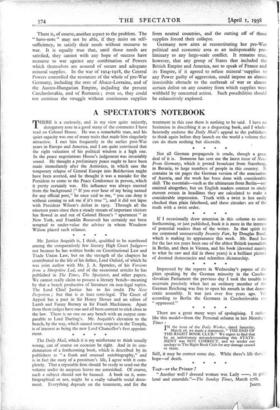A SPECTATOR'S NOTEBOOK
THERE is a curiously, and in my view quite unjustly, derogatory note in a good many of the comments I have read on Colonel House. He was a remarkable man, and his quiet sagacity was one of many traits that made him singularly attractive. I met him frequently in the earlier post-War years in Europe and America, and I am quite convinced that the right valuation of his political wisdom is a high one. In the peace negotiations House's judgement was invariably sound. He thought a preliminary peace ought to have been made immediately after the Armistice, in which case the temporary relapse of Central Europe into Bolshevism might have been averted, and he thought it was a mistake for the President to come to the Peace Conference in person, which it pretty certainly was. His influence was always exerted from the background (" If you ever hear of my being named for any official post," he once said to me, " you can deny it without coming to ask me if it's true "), and it did not lapse with President Wilson's defeat in 1919. Through all the nineteen years since then a steady stream of important visitors has flowed in and out of Colonel House's " apartment " in New York, and Franklin Roosevelt has certainly not been tempted to under-value the adviser in whom Woodrow Wilson placed such reliance.














































 Previous page
Previous page